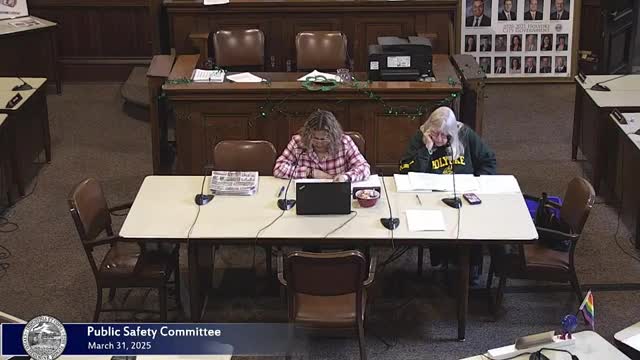Holyoke committee hears updated needle-exchange totals, Narcan distribution; orders quarterly reports from Tapestry
Get AI-powered insights, summaries, and transcripts
Subscribe
Summary
City council public safety committee heard data from Tapestry on syringes collected and naloxone distribution, agreed that Tapestry will provide quarterly needle‑collection reports and that the committee’s earlier orders on Narcan distribution were complied with.
The Holyoke Public Safety Committee heard updated harm‑reduction data from Tapestry on March 31, 2025, and voted that the nonprofit provide regular reports on needle distribution and collection.
At the meeting, Pedro Alvarez, Tapestry’s director of harm reduction operations, said that in the past year the program handled 314,160 syringes brought in and distributed 257,906 syringes, with 1,930 unique participants and 6,353 client encounters. He said the Holyoke site recorded about 370 wound‑care encounters and that nearly 3,000 naloxone (Narcan) kits were distributed by Holyoke harm‑reduction staff in the same period. Alvarez said roughly 20% of people seen engaged in further services such as substance‑use treatment, housing or medical referrals.
The committee’s order asking Tapestry for needle‑collection data (item 3 on the agenda) was introduced by Councilor Linda Bacon and discussed by committee members and Tapestry staff. Councilors moved that Tapestry provide quarterly reporting on the numbers of needles distributed and collected; the committee recorded the order as complied with following a motion to accept quarterly reporting.
Why it matters: Committee members said updated counts will help monitor whether discarded syringes around public spaces—particularly near Lawrence School and its playground—are increasing or decreasing, and will provide a basis for any follow‑up work on public safety and cleanup coordination. Councilors and Tapestry staff also discussed the geographic focus of outreach and the limits of local treatment capacity.
Alvarez described Tapestry’s current outreach in the Lawrence School area: a mobile health truck parks approximately one block from the school (at the lot across from Sam’s parking, at Race and Cabot), offering wound care, STI and hepatitis testing, HIV prevention services, vaccination, and medication‑assisted‑treatment (MOUD) assessment and referrals. He said Tapestry moved its site from 158 Main Street to 306 Ray Street and that the program receives on average about 12 hotline requests per month to pick up discarded syringes. Alvarez invited council members to visit the site and to join monthly community needle cleanups, typically held on the second Saturday of each month.
Committee members asked about where participants live and how many contacts originate near Lawrence School; Alvarez said Tapestry collects zip‑code data but did not have those figures at the meeting and committed to providing more granular location data in follow‑up communications. He also noted that local detox capacity has declined since Providence Hospital (MiraVista) stopped providing acute detox services in Holyoke, requiring referrals to other communities.
The committee also considered an order about making Narcan more available (item 4). Alvarez and Board of Health representatives described recent increases in fatal overdoses in Holyoke: Alvarez said state data (mass.gov) show a rise in overdose deaths locally from 11 in 2016 to 37 in 2023. Tapestry staff noted efforts to distribute naloxone, provide trainings in English and Spanish, and to pilot public NaloxBoxes (vending‑style cabinets with naloxone) but said placement of boxes is complicated when property is privately owned. Alvarez said he had a box removed after it was mounted on a privately owned building.
Board of Health commissioner Nicole Arnold said the board prioritizes public health and enforcement when necessary: she reported 27 tobacco‑related violations earlier in the year (a separate agenda item) and spoke generally about enforcement practice; at this meeting she reiterated the board’s public health focus while acknowledging economic concerns raised by other councilors.
Procedural outcome: Councilors voted that Tapestry’s responses satisfy the orders for items 3 and 4 and recorded both orders as complied with; the committee asked Tapestry to submit a regular (quarterly) data communication documenting needles collected and distributed going forward.
Contact and service details provided at the meeting: Tapestry’s hotline (as shown on its outreach card) is (413) 650‑2679; the Tapestry site is at 306 Ray Street (corner of Race and Cabot); office hours were stated as Monday–Friday, 8 a.m.–4 p.m. Alvarez also provided a site number (413‑315‑3732) for direct contacts with program staff. The committee was given Tapestry’s offer of trainings and sharps containers for community partners and schools.
